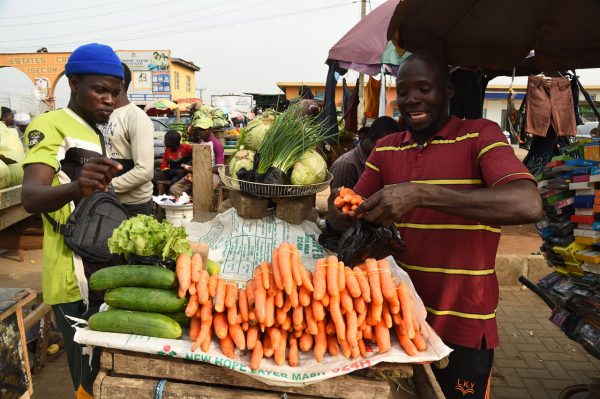In October 2023, Nigeria found itself grappling with a significant uptick in headline inflation rate, soaring to 27.33%, according to the latest data released by the National Bureau of Statistics (NBS). This marked a notable increase of 0.61% from the preceding month and a substantial 6.24% surge compared to the same period in 2022. The report, unveiled in Abuja on a Wednesday, outlined key factors contributing to this surge in inflation, shedding light on the intricate dynamics of Nigeria’s economic landscape.
On a year-on-year basis, the headline inflation rate for October 2023 was 6.24% higher than the corresponding period in 2022, standing at 21.09%. The report attributed this surge to an escalation in the costs of items within the basket of goods and services at the divisional level. Notable contributors to this increase were observed in specific sectors, with food and non-alcoholic beverages registering a significant uptick at 14.16%. Additionally, housing, water, electricity, gas, and other fuels experienced a surge of 4.57%.
Further dissecting the components influencing the inflation rate, the report highlighted increases in clothing and footwear (2.09%), transport (1.78%), furnishings, household equipment, and maintenance (1.37%), education (1.08%), and health (0.82%). Miscellaneous goods and services, restaurants and hotels, alcoholic beverages, tobacco, kola, recreation and culture, and communication also contributed to the upward trend, albeit to a lesser extent.
The month-on-month analysis for October 2023 revealed a headline inflation rate of 1.73%, representing a 0.37% decrease from September 2023, where the rate stood at 2.10%. This suggests that, during October 2023, the rate of increase in the average price level was less pronounced than in the preceding month.
The report delved into the Consumer Price Index (CPI) for the 12 months ending October 2023, showing a percentage change of 23.44%. This indicated a 5.57% increase compared to the same period in 2022, where the percentage change was 17.86%. The inflationary pressures were further accentuated by global events, such as the crisis in Ukraine and Russia’s invasion, leading to disruptions in supply chains. The ensuing consequences were felt keenly in Nigeria, exacerbating inflation and escalating fuel costs.
The food inflation rate for October 2023 surged to 31.52% on a year-on-year basis, marking a 7.80% increase compared to October 2022 at 23.72%. The report attributed this rise to increases in the prices of oil and fats, bread and cereals, fish, potatoes, yams and other tubers, fruits, meat, vegetables, milk, cheese, and eggs. On a month-on-month basis, the food inflation rate for October 2023 was 1.91%, indicating a 0.54% drop compared to September 2023 at 2.45%. This decline was attributed to decreases in the average prices of fruits, oil and fats, coffee, tea, cocoa, bread, and cereals.
The report further explored the “All items less farm produce and energy” or core inflation, which excludes the prices of volatile agricultural produce and energy. Core inflation stood at 22.58% in October 2023 on a year-on-year basis, showcasing a 5.12% increase compared to October 2022 at 17.46%. The exclusion of Premium Motor Spirit (PMS) was noted due to the deregulation of the commodity by the removal of subsidy.
On a month-on-month basis, the core inflation rate for October 2023 was 1.39%, indicating a 0.83% drop compared to September 2023 at 2.22%. The average 12-month annual inflation rate was 19.98% for the 12 months ending October 2023, marking a 4.60% increase from the 15.38% recorded in October 2022.
Urban inflation for October 2023 was reported at 29.29% on a year-on-year basis, reflecting a 7.66% increase compared to the 21.63% recorded in October 2022. On a month-on-month basis, the urban inflation rate was 1.81% in October, representing a 0.43% decline compared to September 2023 at 2.24%. In contrast, rural inflation for October 2023 was 25.58% on a year-on-year basis, marking a 5.01% increase compared to the 20.57% recorded in October 2022. On a month-on-month basis, rural inflation was 1.67%, indicating a 0.29% decrease compared to September 2023 at 1.96%.
The report also provided a state-wise analysis, revealing that in October 2023, Kogi had the highest all items inflation rate on a year-on-year basis at 34.20%, followed by Rivers at 31.44%, and Lagos at 31.33%. Conversely, Borno recorded the slowest rise in headline inflation on a year-on-year basis at 20.06%, followed by Jigawa at 23.52%, and Sokoto at 24.47%.
On a month-on-month basis, Yobe had the highest all items inflation rate in October 2023 at 3.72%, followed by Jigawa at 2.85%, and Sokoto at 2.84%. Kogi recorded the slowest rise in month-on-month inflation at 1.01%, followed by Edo at 1.05%, and Kwara at 1.18%.
In terms of food inflation, Kogi led on a year-on-year basis at 41.74%, followed by Kwara at 38.48%, and Lagos at 37.37%. On a month-on-month basis, Yobe had the highest food inflation rate at 5.35%, followed by Sokoto at 3.68%, and Jigawa at 3.45%. Edo recorded the slowest rise in month-on-month food inflation at 0.95%, followed by Katsina at 1.03%, and Rivers at 1.10%.
Conclusion: inflation rate

The NBS report painted a comprehensive picture of the economic challenges facing Nigeria in October 2023. The surge in inflation, influenced by both domestic and global factors, highlighted the need for strategic measures to stabilize the economy and mitigate the impact on consumers and businesses. The interplay of various sectors, including food, housing, and transport, underscored the complexity of addressing inflationary pressures. As Nigeria navigates these challenges, policymakers and stakeholders will likely intensify efforts to implement effective economic policies and reforms.










